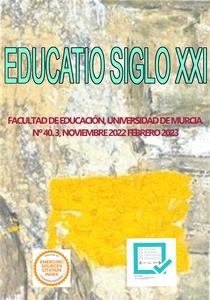Characteristics of university teaching in institutions in Spain, Mexico and Venezuela
Abstract
The complexity of university teaching requires the development of studies that allow contrasting the experiences of teachers in different settings, so this work compares the characteristics of the training of students in three universities, one in Spain, one in Mexico and one in Venezuela. A non-experimental design research was carried out with a descriptive level using the Questionnaire “Indicators of Teaching Excellence at the University of Granada”. The results demonstrate the importance attributed in teaching to the following features: knowledge of the subject, planning, communication, didactics, evaluation, and reflection as mechanisms for permanent innovation. The relevance of evaluation and motivation were found as coincident elements in the three institutions, that demonstrates a shared vision of context-independent teaching. To conclude, the centrality of the ethical dimension stands out, the vision of this activity as a quality service prevails in which improvisation must be avoided and an innovative action must be deployed and also permanent communication and fair evaluation.
Downloads
-
Abstract1115
-
PDF (Español (España))454
References
Aguilera, J.L. (2019). La tutoría universitaria como práctica docente: fundamentos y métodos para el desarrollo de planes de acción tutorial en la universidad. Pro-Posições, 30(e20170038), 1-27. doi:https://doi.org/10.1590/1980-6248-2017-0038
Andrade-Abarca, P.S., Jaramillo, L.N., y Loaiza-Aguirre, M.I. (2017). Aplicación del SEEQ como instrumento para evaluar la actividad docente universitaria. Revista de Investigación Educativa, 36(1), 259-275. doi:https://doi.org/10.6018/rie.36.1.260741
Barrio, J., y Barrio, A. (2018). Análisis de la habilidad comunicativa docente y pautas de actuación. Atraer la atención hablando: un reto para la enseñanza universitaria. INFAD Revista de Psicología, 1(1), 73-84. doi:https://doi.org/10.17060/ijodaep.2018.n1.v1.1160
Casado, M., Martínez, M., y Patrão, M.do Céu (Coords.) (2018). Declaración sobre ética e integridad en la docencia universitaria. FEM: Revista de la Fundación Educación Médica, 21(2), 65-74. Recuperado de http://scielo.isciii.es/scielo.php?script=sci_arttext&pid=S2014-98322018000200003&lng=es&tlng=es
Chávez, G., y Treviño, Ma.C. (2019). La excelencia en la enseñanza universitaria visión del profesorado en una institución del norte de México. Praxis Sociológica, 24, 185-200. Recuperado de https://dialnet.unirioja.es/servlet/articulo?codigo=7051713
Escobar, N. (2016). El conocimiento didáctico del contenido en la formación continua del docente de pregrado. En D. Izarra Vielma (Coord.). Investigación, Pedagogía y Conocimiento (320-348). San Cristóbal, Venezuela: IMPM.
Fernández Cruz, M. y Romero López, A. (2010). Indicadores de excelencia docente en la Universidad de Granada. Revista Portuguesa de Pedagogía, 44(1), 83-117. doi:http://dx.doi.org/10.14195/1647-8614_44-1_4
García – Ramírez, J.M. (2012), La comunicación, clave de la excelencia visible en la Educación Superior, Journal for Educators, Teachers and Trainers, Vol. 3, pp. 25-36. http;//www.ugr.esd/jett/index.php.
González-Losada S., y Triviño-García, M.A. (2018). Las estrategias didácticas en la práctica docente universitaria. Profesorado. Revista de currículum y formación del profesorado, 22(2), 371-388. doi:https://doi.org/10.30827/profesorado.v22i2.7728
Hernández, R., Fernández, C. y Baptista, P. (2014). Metodología de la investigación. México: McGraw Hill.
Hortal, A. (2002). Ética general de las profesiones. Bilbao: Desclée de Brouwer.
Laudadío, J. y Mazzitelli, C. (2018). Adaptación y validación del Cuestionario de Relación Docente en el Nivel Superior. Interdisciplinaria, 35(1), 153-170. Recuperado de https://www.redalyc.org/articulo.oa?id=18058784009
Lion, C. y Maggio, M. (2019). Desafíos para la enseñanza universitaria en los escenarios digitales contemporáneos. Aportes desde la investigación. Cuadernos de Investigación Educativa, 10(1), 13-25. doi:https://dx.doi.org/10.18861/cied.2019.10.1.2878
Palella, S. y Martins, F. (2010). Metodología de la investigación cuantitativa. Caracas: Fedeupel.
Paricio, J. (2018). Marco de Desarrollo Profesional del Profesorado Universitario. Planteamiento general y dimensiones. Zaragoza: Redu.
Piovani, J. y Krawczyk, N. (2017). Los Estudios Comparativos: algunas notas históricas, epistemológicas y metodológicas. Educação & Realidade, 42(3), 821-840. Recuperado de: https://www.redalyc.org/jatsRepo/3172/317253008002/html/index.html
Ramírez, T. (2021). Investigación y papers en Venezuela (I) Auge y caída hasta nuevo aviso. Politika UCAB Revista del CEPYG. Recuperado de: https://politikaucab.net/2021/04/20/investigacion-y-papers-en-venezuela-i-auge-y-caida-hasta-nuevo-aviso/
Rivadeneira, E. (2017). Competencias didácticas-pedagógicas del docente, en la transformación del estudiante universitario. Revista Científica Electrónica de Ciencias Humanas. 37(13), 41-55. Recuperado de https://www.redalyc.org/pdf/709/70952383003.pdf
Rivera, A. (2019). La práctica pedagógica y el aprendizaje basado en problemas. Journal for Educators, Teachers and Trainers, Vol. 10(1). 8–11. Recuperado de: https://jett.labosfor.com/pdf_1419_48b65f4c7fce91baea8a050d16f58a8a.html
Sanz, R, y López, E. (2016). El componente ético de la evaluación educativa. Rasgos del docente. En D. Izarra Vielma (Coord.). Experiencias y perspectivas en ética profesional y responsabilidad social universitaria en Iberoamérica (30-46). San Cristóbal, Venezuela: Universidad Pedagógica Experimental Libertador.
Shulman, L. (2005) Conocimiento y Enseñanza: Fundamentos de la Nueva Reforma. Profesorado. Revista de currículum y formación del profesorado, 9(2), 1-30. Recuperado de http://www.redalyc.org/articulo.oa?id=56790202
Villarroel, V., y Bruna, D. (2017). Pedagogical Competencies of University Teachers: A Case Study, Which Incorporates the Perspective of Chilean Teachers and Students. Formación universitaria, 10(4), 75-96. doi:https://dx.doi.org/10.4067/S0718-50062017000400008
Copyright (c) 2022 Servicio de Publicaciones de la Universidad de Murcia

This work is licensed under a Creative Commons Attribution-NonCommercial-NoDerivatives 4.0 International License.
Original work publishes in this journal is subject to the following terms:
1. Murcia University Press (the publishing house) holds the copyright of the publishes work, and favours and allows their reutilization under the use license stated in point 2.
© Servicio de Publicaciones, Universidad de Murcia, 2015
2. Work is published in the electronic edition under a license (Creative Commons Reconocimiento-NoComercial-SinObraDerivada 4.0 España (legal text). They can be copied, used, disseminated, transmitted and publicly presented, as long as: i) authorship and original publication source is acknowledged (journal, publishing house and URL of the work); ii) are not used for commercial purposes; iii) the existence and specifications of this use license is stated.
3. Conditions for self-archive. Authors are allowed and encouraged to disseminate electronically the pre-pint (before review) and/or post-print (accepted for publication) versions of their work before their publication since that favours earlier circulation and dissemination resulting in an increased chance for the authors to be cited and for the work to reach a bigger share of the academic community. Colour: RoMEO: green.








